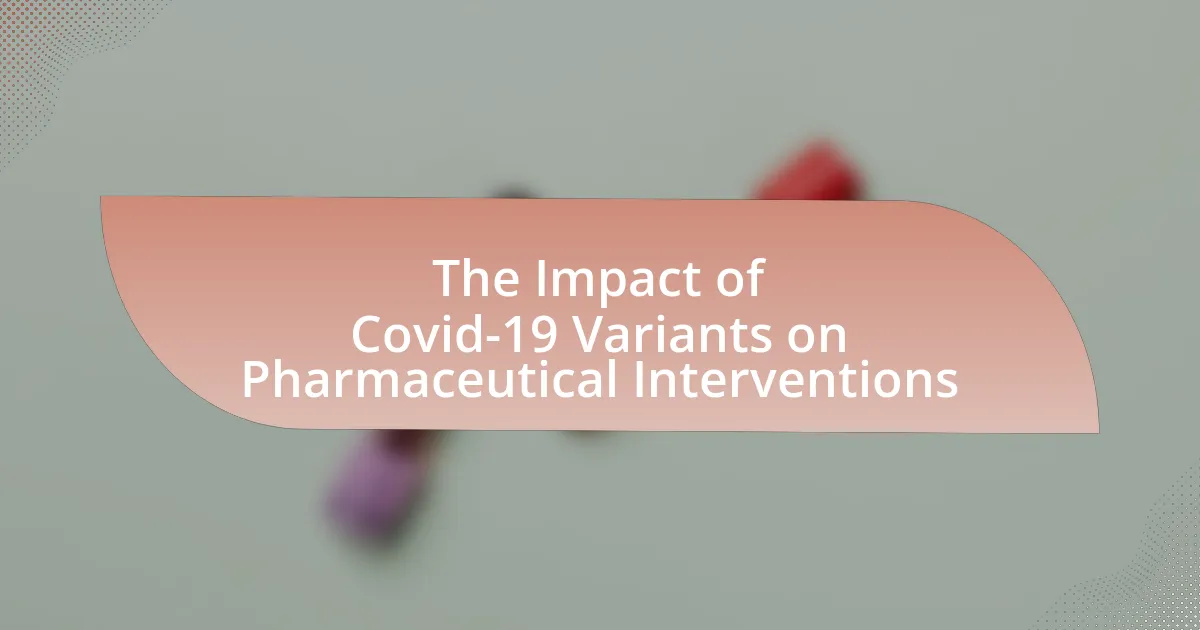Covid-19 variants are mutations of the SARS-CoV-2 virus that impact transmissibility, severity, and vaccine efficacy, with notable variants including Alpha, Beta, Delta, and Omicron. The emergence of these variants is driven by genetic mutations during viral replication, influenced by environmental factors and immune responses. This article examines the genetic characteristics of different variants, their implications for public health, and the effects on vaccine effectiveness and pharmaceutical interventions. It highlights the necessity for ongoing research, genomic surveillance, and adaptive strategies in vaccine development to address the evolving nature of Covid-19 variants and their impact on healthcare systems.

What are the Covid-19 variants and their significance?
Covid-19 variants are mutations of the original SARS-CoV-2 virus that have undergone genetic changes, leading to differences in transmissibility, severity, and vaccine effectiveness. Significant variants include Alpha, Beta, Gamma, Delta, and Omicron, each associated with varying degrees of increased transmissibility and potential resistance to neutralization by antibodies generated from previous infections or vaccinations. For instance, the Delta variant demonstrated a 60% increased transmissibility compared to Alpha, while Omicron showed substantial mutations in the spike protein, impacting vaccine efficacy. These variants are crucial for public health responses and pharmaceutical interventions, as they inform vaccine updates and treatment strategies to effectively combat the evolving virus.
How do Covid-19 variants emerge and evolve?
Covid-19 variants emerge and evolve primarily through mutations in the virus’s genetic material during replication. These mutations can occur randomly or as a response to selective pressures, such as immune responses from previous infections or vaccinations. For instance, the spike protein of the virus, which is crucial for its ability to infect human cells, may undergo changes that allow the virus to evade immune detection, leading to variants like Delta and Omicron. Studies have shown that the rate of mutation in SARS-CoV-2 is approximately 1-2 mutations per month, which contributes to the emergence of new variants.
What genetic mutations characterize different Covid-19 variants?
Different Covid-19 variants are characterized by specific genetic mutations in the spike protein and other regions of the viral genome. For instance, the Alpha variant (B.1.1.7) features the N501Y mutation, which enhances binding affinity to human ACE2 receptors, while the Beta variant (B.1.351) includes E484K and K417N mutations, which may confer resistance to neutralizing antibodies. The Delta variant (B.1.617.2) is marked by the L452R mutation, associated with increased transmissibility. These mutations impact the efficacy of vaccines and therapeutic interventions, as evidenced by studies showing reduced neutralization of certain variants by antibodies generated from previous infections or vaccinations.
How do environmental factors influence the emergence of variants?
Environmental factors significantly influence the emergence of variants by creating conditions that facilitate viral mutation and transmission. For instance, high population density and increased human interaction can lead to more opportunities for the virus to replicate, thereby increasing the likelihood of mutations. Additionally, environmental stressors such as temperature fluctuations and humidity levels can affect viral stability and host immune responses, further promoting variant development. Studies have shown that variants often arise in regions with high transmission rates, as seen with the emergence of the Delta variant in densely populated areas.
Why are Covid-19 variants a concern for public health?
Covid-19 variants are a concern for public health because they can potentially increase transmissibility, evade immunity from previous infections or vaccinations, and lead to more severe disease outcomes. Variants such as Delta and Omicron have demonstrated higher transmission rates compared to the original strain, contributing to surges in cases and overwhelming healthcare systems. Additionally, studies indicate that some variants may partially escape neutralizing antibodies, reducing the effectiveness of vaccines and natural immunity, which complicates control measures and prolongs the pandemic. For instance, research published in the journal Nature in 2021 highlighted that the Omicron variant showed significant mutations in the spike protein, which is targeted by most vaccines, raising alarms about vaccine efficacy.
What impact do variants have on transmission rates?
Variants significantly increase transmission rates of COVID-19. For instance, the Delta variant was shown to be approximately 60% more transmissible than the Alpha variant, leading to a surge in cases globally. This increased transmissibility is attributed to mutations in the virus that enhance its ability to bind to human cells and evade immune responses, as evidenced by studies published in journals such as Nature and The Lancet.
How do variants affect vaccine efficacy?
Variants can significantly reduce vaccine efficacy by altering the virus’s spike protein, which is the primary target for neutralizing antibodies generated by vaccines. For instance, studies have shown that the Delta variant led to a decrease in vaccine effectiveness against symptomatic infection, dropping to around 66% compared to the original strain, which had efficacy rates above 90%. Additionally, the Omicron variant demonstrated even greater evasion, with some vaccines showing reduced effectiveness against infection and transmission, although they still provided substantial protection against severe disease and hospitalization. This reduction in efficacy underscores the importance of ongoing vaccine updates and booster shots to enhance immunity against emerging variants.

How do Covid-19 variants influence pharmaceutical interventions?
Covid-19 variants significantly influence pharmaceutical interventions by altering the effectiveness of vaccines and treatments. Variants such as Delta and Omicron have shown mutations in the spike protein, which can reduce vaccine-induced immunity and necessitate updates to vaccine formulations. For instance, studies have indicated that the effectiveness of mRNA vaccines against the Omicron variant is lower compared to earlier strains, prompting pharmaceutical companies to develop booster shots specifically targeting these variants. Additionally, antiviral treatments may require adjustments in dosing or formulation to maintain efficacy against emerging variants, as seen with the reduced effectiveness of certain monoclonal antibodies against specific strains. This dynamic necessitates ongoing surveillance and rapid response from the pharmaceutical industry to ensure that interventions remain effective against evolving viral threats.
What types of pharmaceutical interventions are available for Covid-19?
Pharmaceutical interventions available for Covid-19 include antiviral medications, monoclonal antibodies, and corticosteroids. Antiviral medications such as remdesivir have been shown to reduce the duration of symptoms and improve recovery rates in hospitalized patients. Monoclonal antibodies, like casirivimab and imdevimab, are used for treating mild to moderate Covid-19 in high-risk patients, demonstrating efficacy in reducing hospitalization rates. Corticosteroids, particularly dexamethasone, have been proven to lower mortality in severe cases by mitigating the inflammatory response. These interventions are supported by clinical trials and guidelines from health authorities, confirming their effectiveness in managing Covid-19.
How do vaccines respond to different Covid-19 variants?
Vaccines exhibit varying levels of effectiveness against different Covid-19 variants. For instance, studies have shown that mRNA vaccines, such as those developed by Pfizer-BioNTech and Moderna, maintain strong efficacy against severe disease caused by variants like Delta and Omicron, although there is a noted reduction in neutralizing antibody response. Research published in the New England Journal of Medicine indicates that while two doses of these vaccines provide substantial protection against hospitalization and death, breakthrough infections can occur more frequently with variants that have mutations in the spike protein, such as Omicron. Additionally, booster doses have been shown to enhance protection against these variants, reaffirming the importance of vaccination in mitigating the impact of Covid-19 variants.
What antiviral treatments are effective against various variants?
Antiviral treatments effective against various COVID-19 variants include remdesivir, molnupiravir, and nirmatrelvir/ritonavir (Paxlovid). Remdesivir has shown efficacy against multiple variants, including Delta and Omicron, by inhibiting viral RNA polymerase, which is crucial for viral replication. Molnupiravir, an oral antiviral, has demonstrated effectiveness against variants by introducing errors into the viral RNA, thereby reducing viral load. Nirmatrelvir/ritonavir, a combination therapy, has been effective against Omicron and other variants by inhibiting the main protease necessary for viral replication. Clinical studies have validated these treatments, showing reduced hospitalization and mortality rates among patients infected with various COVID-19 variants.
Why is ongoing research critical for adapting pharmaceutical interventions?
Ongoing research is critical for adapting pharmaceutical interventions because it enables the identification and understanding of emerging variants of pathogens, such as SARS-CoV-2. Continuous studies provide essential data on how these variants may affect the efficacy of existing treatments and vaccines, ensuring that interventions remain effective. For instance, research published in the journal Nature in 2021 demonstrated that certain variants exhibited mutations that reduced vaccine effectiveness, highlighting the need for real-time data to inform updates to pharmaceutical strategies. This adaptability is crucial for public health responses, as it allows for timely modifications to treatment protocols and vaccine formulations in response to evolving threats.
How do clinical trials adapt to the emergence of new variants?
Clinical trials adapt to the emergence of new variants by implementing flexible study designs and modifying protocols to assess the efficacy of treatments against these variants. Regulatory agencies, such as the FDA, allow for adaptive trial designs that enable researchers to make real-time adjustments based on emerging data about variant prevalence and characteristics. For instance, trials may incorporate new endpoints or adjust dosing regimens to evaluate the response to specific variants, ensuring that the data collected remains relevant and informative. This adaptability is crucial, as evidenced by the rapid updates to vaccine trials in response to variants like Delta and Omicron, which demonstrated the need for ongoing evaluation of vaccine effectiveness against evolving strains.
What role does genomic surveillance play in pharmaceutical development?
Genomic surveillance plays a critical role in pharmaceutical development by enabling the identification and tracking of genetic variations in pathogens, such as the SARS-CoV-2 virus responsible for COVID-19. This surveillance informs vaccine design and therapeutic strategies by providing real-time data on emerging variants, which can affect the efficacy of existing treatments and vaccines. For instance, studies have shown that genomic data can guide modifications in vaccine formulations to enhance their effectiveness against new variants, as seen with the rapid updates made to mRNA vaccines in response to variants like Delta and Omicron. Thus, genomic surveillance is essential for ensuring that pharmaceutical interventions remain effective in the face of evolving viral threats.

What are the implications of Covid-19 variants on future pharmaceutical strategies?
Covid-19 variants significantly influence future pharmaceutical strategies by necessitating ongoing vaccine adaptations and the development of broad-spectrum antiviral therapies. As variants like Delta and Omicron have demonstrated increased transmissibility and potential vaccine escape, pharmaceutical companies must prioritize research into variant-specific vaccines and booster shots to maintain efficacy. For instance, studies have shown that mRNA vaccines can be modified to target emerging variants, as evidenced by the rapid development of updated formulations in response to the Omicron variant. Additionally, the emergence of variants underscores the need for robust surveillance systems and rapid response frameworks to inform pharmaceutical development, ensuring that interventions remain effective against evolving viral strains.
How can pharmaceutical companies prepare for future variants?
Pharmaceutical companies can prepare for future variants by investing in flexible vaccine platforms and enhancing genomic surveillance. Flexible vaccine platforms, such as mRNA technology, allow for rapid modifications to address emerging variants, as demonstrated by the swift adaptation of COVID-19 vaccines to new strains. Enhanced genomic surveillance enables early detection of variants, facilitating timely updates to vaccines and treatments. For instance, the World Health Organization emphasizes the importance of genomic sequencing in tracking variants, which supports proactive adjustments in pharmaceutical strategies.
What strategies can enhance vaccine adaptability to new variants?
Strategies that can enhance vaccine adaptability to new variants include the use of mRNA technology, continuous genomic surveillance, and the development of pan-coronavirus vaccines. mRNA technology allows for rapid modification of vaccine sequences in response to emerging variants, as demonstrated by the swift updates made to COVID-19 vaccines in response to variants like Delta and Omicron. Continuous genomic surveillance enables the identification of mutations in circulating viruses, informing timely vaccine updates. Additionally, pan-coronavirus vaccines aim to provide broader protection against multiple strains, potentially reducing the need for frequent updates. These strategies collectively enhance the ability of vaccines to remain effective against evolving viral variants.
How can public health policies support pharmaceutical innovation?
Public health policies can support pharmaceutical innovation by providing funding, regulatory frameworks, and incentives for research and development. For instance, government initiatives like the Biomedical Advanced Research and Development Authority (BARDA) in the United States have allocated billions of dollars to accelerate the development of vaccines and therapeutics, particularly during health crises such as the COVID-19 pandemic. These policies create a conducive environment for pharmaceutical companies to invest in innovative solutions, as evidenced by the rapid development and deployment of COVID-19 vaccines, which were facilitated by streamlined regulatory processes and emergency use authorizations.
What best practices should be followed in response to emerging variants?
Best practices in response to emerging variants include continuous genomic surveillance, rapid vaccine adaptation, and public health communication. Continuous genomic surveillance allows for the timely identification of new variants, which is crucial for understanding their transmissibility and potential resistance to existing vaccines. Rapid vaccine adaptation ensures that vaccines can be modified to target specific variants, as seen with mRNA vaccines that can be updated quickly. Effective public health communication is essential to inform the public about the importance of vaccination and adherence to health guidelines, which has been shown to reduce transmission rates. These practices are supported by data indicating that countries employing robust surveillance and adaptive vaccination strategies have better control over variant spread.
How can healthcare systems effectively implement updated interventions?
Healthcare systems can effectively implement updated interventions by establishing robust communication channels, ensuring staff training, and utilizing data-driven decision-making. Effective communication facilitates the dissemination of new guidelines and protocols, which is crucial during the rapid evolution of COVID-19 variants. Training healthcare personnel on updated interventions ensures they are equipped to apply new practices correctly, as evidenced by studies showing that well-trained staff improve patient outcomes. Additionally, leveraging data analytics allows healthcare systems to monitor the effectiveness of interventions in real-time, enabling timely adjustments based on emerging evidence and variant characteristics. For instance, the CDC’s adaptive response strategies during the pandemic highlight the importance of data in shaping intervention approaches.
What lessons have been learned from the response to Covid-19 variants?
The response to Covid-19 variants has highlighted the importance of rapid genomic surveillance and adaptability in vaccine development. Effective monitoring of viral mutations allows for timely updates to vaccines, as seen with the mRNA vaccines that were modified to address variants like Delta and Omicron. Studies indicate that vaccines can be adjusted within months to enhance efficacy against emerging strains, demonstrating the need for flexible pharmaceutical strategies. Additionally, the response underscored the significance of global collaboration in sharing data and resources, which is crucial for managing public health crises effectively.


